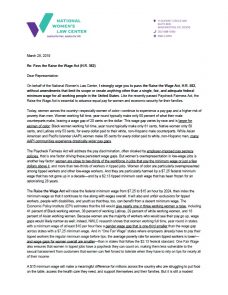In this moment, the future of our rights, our bodily autonomy, our freedom feels uncertain. What we do next will make a difference for decades to come.
On behalf of the National Women’s Law Center, I strongly urge you to pass the Raise the Wage Act, H.R. 582, without amendments that limit its scope or create anything other than a single, fair, and adequate federal minimum wage for all working people in the United States. Like the recently passed Paycheck Fairness Act, the Raise the Wage Act is essential to advance equal pay for women and economic security for their families.
Today, women across the country—especially women of color—continue to experience a pay gap and a higher risk of poverty than men. Women working full time, year round typically make only 80 percent of what their male counterparts make, leaving a wage gap of 20 cents on the dollar. This wage gap varies by race and is larger for women of color: Black women working full time, year round typically make only 61 cents, Native women only 58 cents, and Latinas only 53 cents, for every dollar paid to their white, non-Hispanic male counterparts. While Asian American and Pacific Islander (AAPI) women make 85 cents for every dollar paid to white, non-Hispanic men, many AAPI communities experience drastically wider pay gaps.
The Paycheck Fairness Act will address the pay discrimination, often cloaked by employer-imposed pay secrecy policies, that is one factor driving these persistent wage gaps. But women’s overrepresentation in low-wage jobs is another key factor: women are close to two-thirds of the workforce in jobs that pay the minimum wage or just a few dollars above it, and more than two-thirds of workers in tipped jobs. Women of color are particularly overrepresented among tipped workers and other low-wage workers. And they are particularly harmed by a $7.25 federal minimum wage that has not gone up in a decade—and by a $2.13 tipped minimum cash wage that has been frozen for an astonishing 28 years.
The Raise the Wage Act will raise the federal minimum wage from $7.25 to $15 an hour by 2024, then index the minimum wage so that it continues to rise along with wages overall. It will also end unfair exclusions for tipped workers, people with disabilities, and youth so that they, too, can benefit from a decent minimum wage. The Economic Policy Institute (EPI) estimates that the bill would give nearly one in three working women a raise, including 41 percent of Black working women, 38 percent of working Latinas, 29 percent of white working women, and 18 percent of Asian working women. Because women are the majority of workers who would see their pay go up, wage gaps would likely narrow as well; indeed, NWLC research shows that women working full time, year round in states with a minimum wage of at least $10 per hour face a gender wage gap that is one-third smaller than the wage gap across states with a $7.25 minimum wage. And in “One Fair Wage” states where employers already have to pay their tipped workers the regular minimum wage before tips, the average poverty rate for women tipped workers is lower—and wage gaps for women overall are smaller—than in states that follow the $2.13 federal standard. One Fair Wage also ensures that women in tipped jobs have a paycheck they can count on, making them less vulnerable to the sexual harassment from customers that women can feel forced to tolerate when they have to rely on tips for nearly all of their income.
A $15 minimum wage will make a meaningful difference for millions across the country who are struggling to put food on the table, access the health care they need, and support themselves and their families. But it is still a modest wage relative to the expenses that women and their families face every day, no matter where they live in the United States. According to EPI, by 2024, a single worker without children will need at least full-time earnings at $15 an hour ($31,200 annually) to meet basic needs, and workers in costlier areas and those supporting families will need more. By establishing a $15 federal minimum wage by 2024 and phasing out harmful exclusions, the Raise the Wage Act gradually reaches a single wage floor that will benefit working people and our economy nationwide.
We strongly urge you to reject any amendments or alternatives that would establish a regional minimum wage at the federal level, such as the proposed bill entitled “The Cost-Of-Living Based Minimum Wage Act.” Such an approach would dramatically undercut the impact of the Raise the Wage Act, locking in wages that are already artificially low in many parts of the country because of the power of large national employers—and cementing the wage disparities that the Raise the Wage Act is critically needed to address. In an analysis of a proposal that is actually more generous than the one that will be introduced, EPI found that a regional measure would exclude 15.6 million workers from the raises they would receive under the Raise the Wage Act. Over one-third of those left behind—5.6 million—are women of color.
Women and people of color have been left behind by our economy and our policies far too often, for far too long. Adopting the Raise the Wage Act would mark a vitally important step toward ensuring they can work with equity, dignity, and safety. We urge you to prioritize the Raise the Wage Act in the 116th Congress by passing this important bill without amendments that reduce its strength or scope. If you have any questions, please do not hesitate to contact me at [email protected] or 202-588-5180.
Sincerely,
Emily J. Martin
Vice President for Education & Workplace Justice

